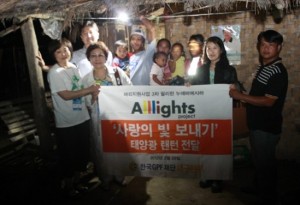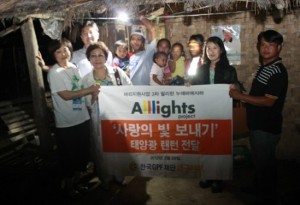
Projects like Alllights Village is engaging Koreans in giving back to the global community and raising the consciousness that all of humanity is One Family Under God.
In 2010, Korea hosted the G20 Summit as the first non G8 nation. Korea is unique, as President Lee Myung Bak shared, because it has “first-hand experience of economic development within living memory.”
In Korea in the 70s, the average family could not afford to put protein on the table. Fish and even eggs were a treat. Beef and pork were extra special.
So much has changed in such a short time. Today Korea has the 15th largest economy in the world.
But, Korea couldn’t have made its miraculous leap alone. When torn by war, twenty-one nations under the UN forces came to support. After the war, billions of dollars in foreign aid supported Korea’s efforts for development like the “New Village Movement” that bound together rich and poor, urban and rural to rebuild Korea. The world has been a part of its making.
And now, Korea has an opportunity to give back in ways that are than just economic. Yes, its example of rapid economic development offers a great deal for developing regions. But Korea also has an opportunity to set a holistic model of peace-building as it examines the issue of unification.
The Korean Dream is a dream of a united nation that honors the value and freedoms of each of its citizens and members of God’s family. If the process is centered on a dream that can bridge the historic and ideological enmity that divides this nation. Korea can create an example for the world of peace-building that is not just political and diplomatic, but includes the spiritual transformation of each person.
This process has started. It has begun with simple acts of service like the Eco Bag and Dream Bus projects. In these ways Koreans are beginning to give back. It is changing the mindset and lifestyle of each person, connecting them as one family. This transformation can breakdown the barriers of North and South within the minds of the Korean people and open a path to reconciliation.
This is what Korea can offer the world.

